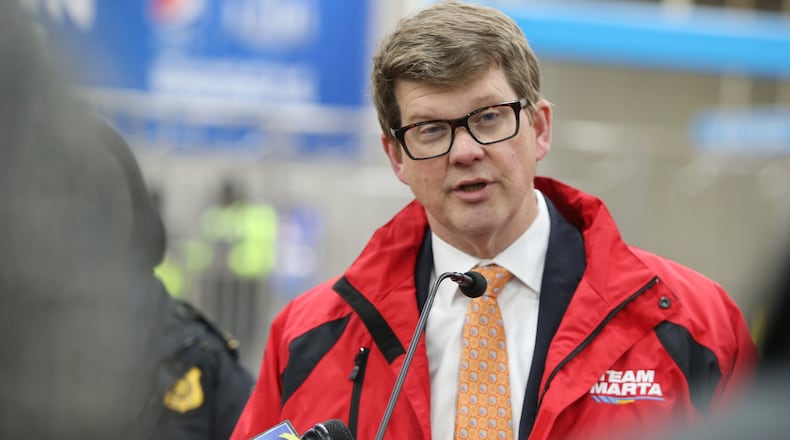MARTA says it will go to court to stop a sickout by bus drivers that has disrupted bus service as the agency prepares for Sunday's Super Bowl.
About 80 bus drivers called in sick Monday morning — a move apparently meant to express the workers’ displeasure with negotiations for a new union contract. MARTA reached a tentative agreement on the contract with the Amalgamated Transit Union Local 732 on Saturday night.
The sickout disrupted bus service but did not affect MARTA rail service. It’s unclear whether it will continue beyond Monday.
But in a statement released Monday afternoon, the agency said it has notified the ATU’s leaders that MARTA will file a court injunction to end the work slowdown. It says it has “demanded that ATU leadership take immediate action disavowing the sickout and demand that union members return to work.”
The transit union did not respond to requests for comment Monday.
The tentative labor agreement would give employees an across-the-board pay increase of 3 percent a year for three years, according to MARTA. It also would pay an additional 25 cents an hour in longevity premiums to all employees with at least 20 years of service. And it would implement an immediate “parity pay adjustment” of 50 cents an hour for all bus and rail operators, and $1 an hour for mechanics and other skilled technicians.
The agreement also provides for a $1,000 retro/ratification payment for full-time employees and $500 for part-time employees if the agreement is ratified by March 1. The agreement must still be approved by the union’s membership and the MARTA board of directors.
At a press conference Monday morning, MARTA CEO Jeffrey Parker said he hoped regular bus service would be restored by the afternoon. However, the agency said it was still experiencing delays late in the day.
In a statement Monday afternoon, Parker cited a Jan. 25 letter to the union “notifying them that any slowdown or organized work stoppage was a violation of state law and MARTA would pursue all disciplinary and legal remedies available.”
“The action today is unacceptable,” Parker said, “and we will use every tool available to make sure our riders are not harmed by this work stoppage.”
The labor unrest comes as Atlanta is preparing to host more than 1 million visitors for the Super Bowl. Tens of thousands of people are expected to take MARTA rail to the big game and to related events.
At the press conference, Parker said he was “truly disappointed” by the workers’ decision to call in sick.
“I’ve spoken with several of the union leadership,” he said. “They have assured me they’re trying to get folks back to work.”
But the announced court action suggests MARTA wasn’t satisfied with those assurances.
At times, the ATU has expressed frustration about recent contract negotiations. But it has taken pains to assure MARTA and the National Football League that it would not disrupt operations during the Super Bowl.
In a Dec. 27 letter to its members obtained by The Atlanta Journal-Constitution, the ATU disavowed a call by “rogue individuals” to skip work on Super Bowl weekend.
The letter urged members to “continue to provide the quality service that has earned us the respect of not only the community and MARTA management but every person who encounters a MARTA employee.” And it asked its members to trust the ATU to “demand a reasonable contract.”
It wouldn't be the first time transit workers have sought to use the Super Bowl as leverage for contract negotiations. Twin Cities transit workers threatened to strike before Minneapolis hosted last year's Super Bowl. But they approved a new contract that averted a strike.
Parker said MARTA is ready for the Super Bowl. It has more than 400 police officers and officers from other jurisdictions to provide security. And it will supplement its regular operations staff with nearly 700 "ambassadors" to guide fans as they make their way to the game and other events.
MARTA has also updated signs to guide fans to Mercedes-Benz Stadium.
“Riding MARTA will be the easiest and most effective way to get to and from the Super Bowl,” Parker said. “We’re prepared to ensure it will be an event that people will appreciate.”
About the Author
Keep Reading
The Latest
Featured




